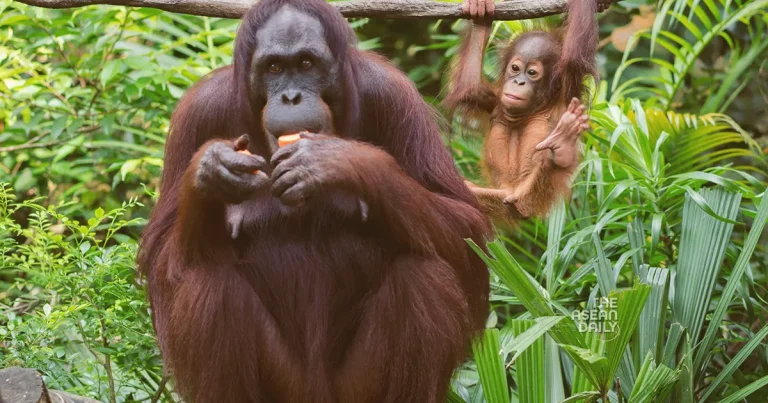8-5-2024 (KUALA LUMPUR) In a bold and unprecedented move, Malaysia has unveiled plans to introduce an unorthodox diplomatic strategy dubbed “orangutan diplomacy” in its efforts to allay concerns over the environmental impact of palm oil production. The Southeast Asian nation, which stands as the world’s second-largest producer of the commodity after Indonesia, intends to offer the iconic great apes as symbolic gifts to major palm oil-importing countries.
The unconventional initiative, likened to China’s renowned “panda diplomacy” by Plantation and Commodities Minister Johari Abdul Ghani, comes in the wake of the European Union’s (EU) recent approval of a ban on imports of commodities linked to deforestation, a move that could potentially inflict significant damage on Malaysia’s lucrative palm oil industry.
“This will prove to the global community that Malaysia is committed to biodiversity conservation,” Johari declared on the social media platform X late on May 7, unveiling the audacious plan. “Malaysia cannot take a defensive approach to the issue of palm oil. Instead, we need to show the countries of the world that Malaysia is a sustainable oil palm producer and is committed to protecting forests and environmental sustainability.”
The decision to leverage the iconic orangutan, a species renowned for its striking red fur and revered as the “man of the forest” in the Malay language, as a diplomatic tool stems from Malaysia’s longstanding contention that the EU’s deforestation law unfairly targets palm oil. The versatile commodity, which finds its way into a myriad of products ranging from lipstick to pizza, has been at the centre of a heated debate over its environmental impact.
While no further details regarding the implementation of “orangutan diplomacy” have been immediately forthcoming, the move underscores Malaysia’s determination to counter allegations of unsustainable practices and safeguard its pivotal palm oil industry.
The plan envisions extending gifts of the critically endangered great apes to major palm oil-importing nations, particularly those with significant stakes in the trade, such as the EU, India, and China. By adopting this unconventional approach, Malaysia aims to showcase its commitment to biodiversity conservation and sustainable practices, thereby addressing concerns that have previously marred the industry’s reputation.
According to the World Wide Fund for Nature (WWF), the orangutan population on the island of Borneo stands at a precarious level of less than 105,000 individuals, underscoring the urgency of conservation efforts to protect this iconic species from further decline.




